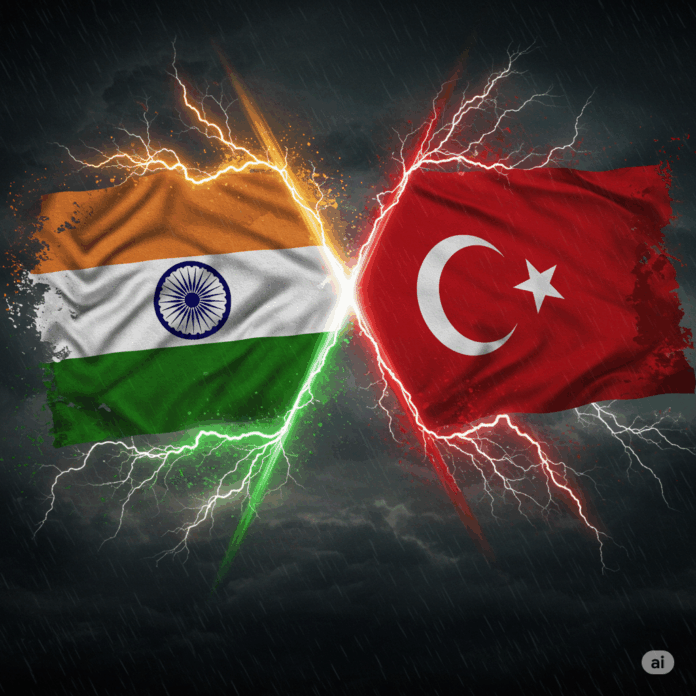Turkey’s vocal support for Pakistan during the recent India-Pakistan conflict has ignited a fierce backlash in India, straining diplomatic ties and threatening significant economic repercussions for Ankara.
Following India’s Operation Sindoor, a military response to the April 22, 2025, Pahalgam terror attack that killed 26 civilians, Turkey’s President Recep Tayyip Erdogan openly backed Pakistan, praising its restraint and supplying military aid, including drones like the Bayraktar TB2. This stance, coupled with Turkey’s historical support for Pakistan on the Kashmir issue, has fueled public outrage in India, prompting boycotts, trade scrutiny, and a reevaluation of business ties. The fallout is poised to disrupt Turkey’s economic interests in India across tourism, aviation, and trade sectors.
The Indian government swiftly revoked the security clearance of Celebi Airport Services India, a Turkish firm handling ground services at nine major Indian airports, including Mumbai and Bengaluru, on May 15, 2025, citing national security concerns. Celebi, employing 3,791 workers, challenged the decision in the Delhi High Court, arguing that the vague revocation threatened jobs and investor confidence. This move signals a broader intent to scrutinize Turkish businesses, with the Modi government reviewing deals worth $10.4 billion in bilateral trade from FY24.
Indian fruit traders, backed by the Swadeshi Jagran Manch, have boycotted Turkish apples, a significant import, while Udaipur’s marble traders have halted Turkish imports, citing Ankara’s “ideological alignment” with Pakistan.
Public sentiment has amplified the economic pressure through a robust boycott movement. Social media campaigns like #BoycottTurkey, trending since May 8, 2025, have driven a 60% drop in travel bookings to Turkey and a 250% surge in cancellations, according to MakeMyTrip. In 2024, 330,100 Indians visited Turkey, contributing modestly to its $33 billion tourism revenue. However, the Confederation of All India Traders (CAIT) is pushing for a nationwide travel boycott, predicting a ripple effect on Turkey’s hospitality sector, including hotels and tour operators. Travel firms like EaseMyTrip and ixigo have suspended bookings to Turkey, redirecting tourists to alternatives like Georgia and Thailand. This shift, if sustained, could dent Turkey’s tourism growth, primarily as Indian travelers accounted for a rising share of visitors.
Aviation ties, a cornerstone of India-Turkey economic relations, are also under strain. IndiGo’s codeshare agreement with Turkish Airlines since 2018 and Air India’s maintenance contracts with Turkish Technic face uncertainty. Posts on X highlight public calls to sever these partnerships, with sentiments of betrayal over Turkey’s military aid to Pakistan despite India’s aid during Turkey’s 2023 earthquake via Operation Dost. The Indian film industry’s decision to avoid shooting in Turkey and Jawaharlal Nehru University’s suspension of an MoU with a Turkish university further deepens the cultural and academic rift.
Beyond economics, the backlash introduces a new angle: India’s strategic recalibration. Turkey’s alignment with Pakistan, including alleged drone supplies, has prompted India to strengthen ties with Greece and Armenia, Turkey’s regional rivals. This diplomatic pivot could isolate Turkey in South Asia, where India wields significant influence. Moreover, the boycott movement reflects India’s growing economic nationalism, with traders and consumers prioritizing “national interest” over cost considerations, as EaseMyTrip’s Prashant Pitti emphasized.
Turkey’s economy, already grappling with inflation and currency depreciation, faces a challenging road ahead. While Indian tourists constitute less than 1% of Turkey’s foreign visitors, losing India’s $10.4 billion trade market and potential aviation contracts could exacerbate Ankara’s fiscal woes. Erdogan’s unwavering stance, reaffirmed on May 15, 2025, risks long-term alienation from a key emerging market. As India intensifies its Track-II offensive through trade and tourism boycotts, Turkey must weigh the cost of its “brotherly ties” with Pakistan against the economic and diplomatic price of antagonizing India.

